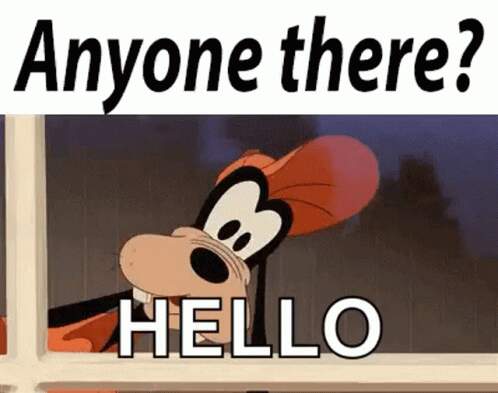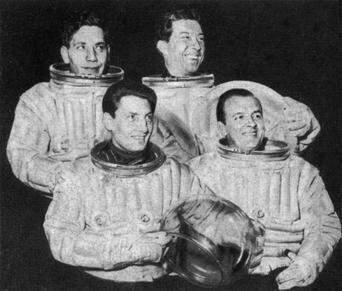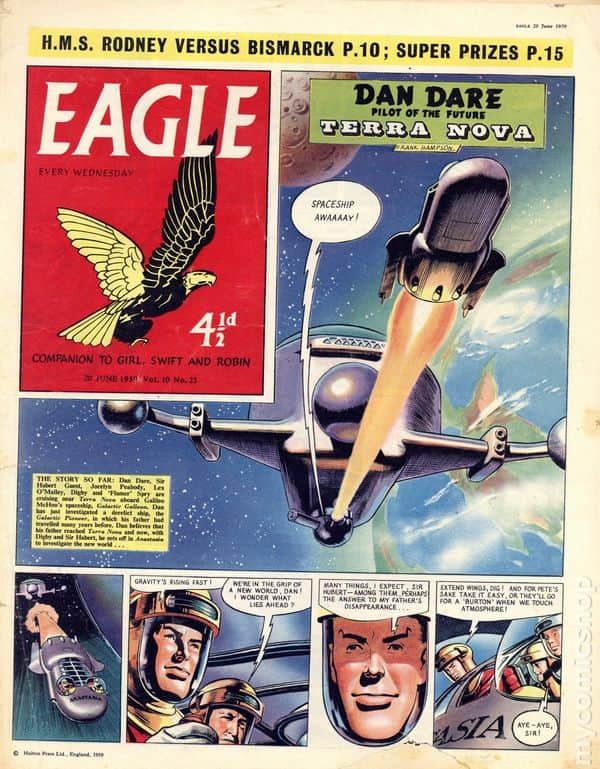Not really
Pain in he arse probably or probeably 

I think it will be teeming with life out there… its life Jim but not as we know it 
 as said in Startrek
as said in Startrek
It is possible that there is other life, it is intelligent and developed enough to understand and receive radio waves and (this is a big ‘and’) be close enough to have started to receive the radio waves that humans are now emitting from earth. That would mean this advanced alien life form is 100 light years away or less. And that really limits it down to a very few stars so very unlikely to actually have life. So most likely we are not found. And even if they noticed our radio signals then this is only them being aware of earth rather than actually ‘found’ us.
Even if our galaxy has planets of other stars with life it is possible that they are hundreds or thousands of light years away. The centre of our galaxy is 26,000 light years away. For now, we are most likely isolated, as would any other life on another planet.
(Cue theories that some of hyper-interstellar travel will be possible and already perfected by them clever aliens.)
Aliens are assumed to look human-ish.
Something to think about when eating. 
One hypothesis is that all multi-cell life starts with a tube. A entrance hole to feed in nutrients, a processing tube to extract feed & energy from the nutrients, and an exit hole to flush out the waste. Bodies evolve around that core tube. So the idea runs that aliens would have the same “tube with a body round it” structure.
But plants extract feed & energy in a different way. Why wouldn’t other intelligent life follow the plant model? Or indeed other models?
Apparently, it was never said in Star Trek but everyone thinks it was because of “Star Trekkin’”
Hundreds of pithy remarks from “Let them eat cake” to “Elementary, my dear Watson”, turn out to be adaptations of comments that were more clumsy or more boring - or which were never said by those thought to have coined them.
No one ever said “Beam me up Scotty”, and Mr Spock never said “It’s life Jim, but not as we know it.”
What he really said: “No life as we know it.”
The exposé, by Elizabeth Knowles, who edits the Oxford Dictionary of Quotations, is not intended to debunk the fabrications but rather show how quotations, like language in general, can subtly alter.
Ms Knowles said: “The last thing we want is to be seen as clever clogs, saying that these quotes are wrong. The fascination lies in how and why they were altered. Misquotations are much more interesting than mistakes.”
In Spock’s case, the misquotation may yet prove to be more accurate than the quotation … ![]()
… and it’s a great song … ![]()
There might be billions of possibilities of life out there but did they all develop at the same time? Some might be coming to the end of their cycle (like some people think we are) some might be just beginning and are at the amoeba stage. So once again humans ability to dream is being massaged by science (and you wonder why we are losing faith in science) Personally, I’m not expecting a visit by an extra terrestrial being anytime soon, no matter how many times I watch ET…
Your point about very different phases of development is well made. Likely that some life forms have come and gone. There’s a whole theory about the propensity for life to be eradicated: catastrophic asteroid hit, volcanic instability and endless winters, self eradication from advanced weapons. And some life forms will be barely beyond plankton.
But I’m going to disagree with your comment about science manipulating people’s thoughts on this issue. Surely it is science fiction writers and film makers that are influencing people’s thoughts on alien life? Science is normally complaining about how unrealistic such books and films are - not adding in more fantasy.
Absolutely Lincs, and fiction writers and film makers put ideas into peoples heads until fiction overlaps with science. Everything we hear and see will have an effect further down the line.
That’s a yes and no for me.
Yes, because it does seem that certain aspects of older science fiction influence developments. Talking computers is one example I think. Perhaps artificial intelligence and walking robots are other examples. Here you are right - the idea influenced people’s efforts.
But no because a lot of science fiction never came into being - because its impossible. Beaming people to different locations, travelling faster than the speed of light, etc. Although you might argue the science fiction is still influencing effort, just futile effort.
Hi
Aliens are already here.
They are currently in Manchester.
They are contactable at the Conservative Party Conference.
Everything to do with life outside Earth has to do with Star Trek. It all started there. ![]()
![]()
In the UK, and for children of the 1950’s, it all stared with the fabulously coloured adventures of Dan Dare:
I don’t recall ever listening to Journey into Space on the wireless - it may be because our family was “glued to the telly”.
Nevertheless, the series has a fascinating history and a very recognisable cast:
Journey into Space - Wikipedia.
Journey Into Space is a BBC Radio science fiction programme written by BBC producer Charles Chilton. It was the last UK radio programme to attract a bigger evening audience than television.(Journey into Space - Wikipedia) Originally, four series were produced (the fourth was a remake of the first), which was translated into 17 languages(Journey into Space - Wikipedia) (including Hindi, Turkish and Dutch)(Journey into Space - Wikipedia) and broadcast in countries worldwide (including Australia, the Netherlands, New Zealand and The United States).(Journey into Space - Wikipedia) Chilton later wrote three best-selling novels and several comic strip stories based upon the radio series.
The first series was created in 1953, soon after Riders of the Range (a popular Western, also written by Chilton) ended its six series on the BBC Light Programme. Michael Standing, then Head of the BBC Variety Department, asked Chilton if he could write a sci-fi programme, and Journey to the Moon (later known as Operation Luna) was the result.(Journey into Space - Wikipedia) Each half-hour episode would usually end with a dramatic cliffhanger, to increase the audience’s incentive to tune into the next episode.
Starring
Andrew Faulds
Guy Kingsley Poynter
Bruce Beeby
Don Sharp
David Williams
David Kossoff
Alfie Bass
David Jacobs
Ed Bishop
Deryck Guyler
Miriam Karlin
and others
The spacesuits looked like this:

Crikey that’s going back a bit. I listened to it every night it was on Children’s Hour, sitting o the floor next to the speaker in the radiogram. I remember Alfie Bass as “Lemmy” and the name Guy Kingsley Pointer as “Doc” is seared into my brain (strange how a name like that gets remembered from childhood) but the rest of the cast is long forgotten.
Some years ago I found some series/episodes on the interweb thing which I downloaded and listened to on some long forgotten trip
I remember Alfie Bass from ‘The Army Game’ where he played excused boots bisley…
And Bootsie and Snudge with Bill Fraser.That was a good one.



